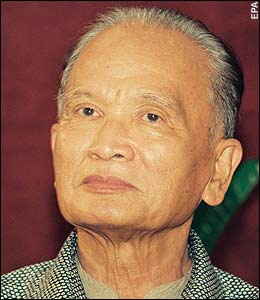 Last week, on 29 December 2014, the defence team of the Khmer Rouge regime’s former chief ideologue, Nuon Chea, filed a full appeal against the 88-year-old’s life sentence and convictions for crimes against humanity.
Last week, on 29 December 2014, the defence team of the Khmer Rouge regime’s former chief ideologue, Nuon Chea, filed a full appeal against the 88-year-old’s life sentence and convictions for crimes against humanity.
Raising 223 grounds of appeal, Nuon Chea requested an acquittal on all charges for which he and Khieu Samphan were convicted in Case 002/01 by the Extraordinary Chambers in the Courts of Cambodia (ECCC) in August 2014.
The 270-page long appeal brief sets out numerous flaws in the criminal proceedings and in the trial judgment.
The brief first highlights two issues that have plagued the investigation: pervasive political interference and a biased flawed investigative approach of the Co-Investigating Judges.
Nuon Chea’s lawyers alleged that “the lack of independence and impartiality permeating the investigation were equally apparent before the Trial Chamber.” According to the defence, the Trial Chamber is “deeply biased” against the Accused and incapable of impartially assessing the evidence (appeal grounds 3 & 4).
The defence based this claim on a careful and detailed analysis of the judgment, which reveals, according to the Appeals brief, that a substantial portion of the findings are, or would be reasonably perceived to be attributable to a pre-disposition against the accused, and not genuinely related to the application of law, or to the assessment of the relevant facts.
In paragraph 75 of the Appeals brief it is held that “the failure to summons Heng Samrin constitutes a flagrant violation of Nuon Chea’s right to present a defence.” The Defence argued that Heng Samrin was without a doubt the most important witness in connection with both the evacuation of Phnom Penh and the crimes allegedly committed at Tuol Po Chrey, and the Chamber’s decision in that regard is of dual relevance to the instant Appeal: it constitutes evidence of the National Judges’ lack of judicial independence and is also an independent violation of Nuon Chea’s right to present a defence.
The defence team of Nuon Chea furthermore argued that the Trial Chamber had erred in repeatedly characterizing the CPK (Communist Party of Kampuchea) as a unified, rigidly hierarchical and pyramidal entity (grounds 37-39). These general findings were subsequently applied to determine Nuon Chea’s criminal liability in multiple ways.
The defence also claimed, in paragraphs 222-224, that the judges erred in law by making a factual finding that the most accurate estimate of people killed by the Khmer Rouge was between 1.5 and 2 million people. According to Nuon Chea’s lawyers, “neither the crimes charged in Case 002/01 nor its temporal scope necessitated making such a finding.” It added that “the Chamber did not assess the reliability of the data, methodologies or assumptions underlying experts’ estimated excess death tolls, or explore the possibility that other variables not considered by these experts could have substantially impacted the validity of their conclusions.”
According to Appeal grounds 179 & 183, the Trial Chamber erred in law in defining other inhumane acts through forced transfer and enforced disappearances. According to the defence in paragraph 411, the Trial Chamber clearly erred in law by stating that ‘[t]he Tokyo Charter, Nuremberg Charter and Control Council Law No. 10 each codified unlawful displacement both as a war crime and crime against humanity”, as each of these sources unambiguously criminalized deportation, not ‘unlawful displacement’, a phrase without any legal significance. The defence held that “the necessary implication of the Chamber’s finding is that no distinction exists between deportation and forcible transfer at all. This error is so flagrant that even the Co-Prosecutors acknowledge it.”
The defence further submitted that the Trial Chamber made several errors in law with relation to the elements of crimes against humanity and the definition of Joint Criminal Enterprise. According to the Appeals brief in paragraph 485, the Trial Chamber’s determination as to the applicability of a Joint Criminal Enterprise was built on a fundamentally defective foundation: namely that between 1975 and 1979, it was customary international law that an accused could incur criminal responsibility by participating in the common purpose and making a significant, but not necessarily indispensable, contribution. However, according to the defence “JCE simply did not exist under customary international law between 1975 and 1979.”
In the concluding paragraphs, the defence argues that, during trial and as became clear from the trial judgment, the Tribunal has been interested “only in presenting a narrative that had been approved before the negotiations for the Tribunal’s establishment even began. That narrative lays any and all blame for what happened in the DK (Democratic Kampuchea) squarely at the feet of Nuon Chea and a tiny group of CPK leaders.” The defence accuses the Tribunal of being a “diligent servant of the victors of the overall conflict that raged in Southeast Asia for three decades” by ensuring that all that had happened before and after the DK remained missing from the final narrative.
In the meantime, Nuon Chea, together with Khieu Samphan, also stand on trial in a second case (Case 002/02) where additional charges will be heard. In a decision on 4 April 2014, the Trial Chamber decided that Case 002/02 will mainly focus on policies and activities surrounding the genocide and execution sites of the Cham and VIetnamese minorities. Trial hearings in Case 002/02 commenced on 17 October 2014.
Considering that the trial in Case 002/02 is likely to be at an advanced stage by the time the appeal judgment in Case 002/01 is issued and the decisions of the Appeal judgment in Case 002/01 can be of relevance for the judgment in Case 002/02, the Defence for Nuon Chea requested that the Supreme Court Chamber issue preliminary rulings prior to and separate from the appeal judgment, where this concerns grounds that are of concern to the trial procedures which are in continuing use before the Trial Chamber.
